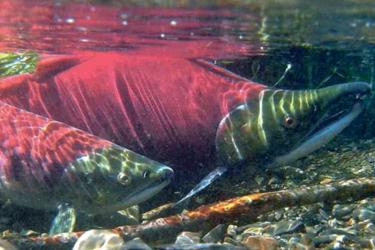The Alaska Fisheries Science Center has hired Dr. Julie Keister to head up its Recruitment Processes Program. Keister and her team’s research focus is twofold. First, they strive to understand the environmental and biological interactions that influence commercially and ecologically important fish in their early years. Second, they endeavor to understand how this affects fitness and survival to an age when they become available to commercial fisheries (recruitment).
“Climate change has brought to the forefront the importance of this critical research,” said Robert Foy, director, Alaska Fisheries Science Center. “We are trying to advance our predictive capabilities to better understand and anticipate how extreme heatwaves and ocean warming events affect the growth, development and survival of fish species like pollock and salmon.” This will help protect fishing jobs, coastal economies, subsistence cultures, and food security.
Prior to joining NOAA Fisheries, Keister was a Professor in the School of Oceanography and Adjunct Professor, School of Aquatic and Fisheries Sciences at the University of Washington, in Seattle. Her responsibilities included research focused on understanding the impacts of climate change on marine communities, principally zooplankton and the fisheries that depend on them.
Notable among her many accomplishments was her leadership in the creation and oversight of the Puget Sound Zooplankton Monitoring Program. The program coordinates research and monitoring efforts among multiple tribes, state and federal agencies, and community organizations to sample 15 sites bi-weekly throughout the southern Salish Sea. Keister designed and oversaw the sampling program, taxonomic identifications, and data analyses. In this capacity, she regularly interacted with regional fisheries managers to ensure the data provided were useful to inform ecosystem-based management and salmon fisheries management decisions.
“We are delighted to have Julie join our team,” said Lyle Britt, division director, Research Assessment and Conservation Engineering Division, Alaska Fisheries Science Center. “She brings a breadth of experience that will help us meet our stakeholders’ needs while strengthening our scientific capabilities in the areas of climate change and recruitment processes research.”
Keister has a Bachelor of Science in Biology from the University of North Carolina at Chapel Hill; a Master’s degree in Marine Estuarine Environmental Sciences from Chesapeake Biological Laboratory, University of Maryland System; and a Ph.D. in Biological Oceanography from the College of Oceanic and Atmospheric Sciences, Oregon State University.

